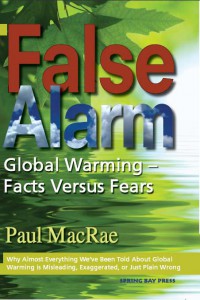Published by on 30 Jul 2008
What has ‘consensus’ climate science got right? (Hint: not much)
Paul MacRae, July 30, 2008
The determinants of complex processes are invariably plural and interrelated.
— David S. Landes, The Wealth and Poverty of Nations, p. 517
Most of what “consensus” climate science tells the public about human-caused global warming is, I believe, misleading, exaggerated, or plain wrong. But what are the consensus climate scientists saying that isn’t misleading, exaggerated, or wrong? These are scientists, after all, men and women of high intelligence, years of academic study and, one can assume, high integrity. Surely they can’t be that wrong. What are they getting right?
First, let’s look at what orthodox climate science is arguing. Here’s as good a statement of the consensus hypothesis as any, from R.A. Warrick, E.M. Barrow and T.M.L. Wigley, all recognized climatologists and self-described climate “alarmists” (in Climate and Sea Level Change: Observations, Projections and Implications, from which the hypothesis is taken, they note “the alarming rate of atmospheric concentrations of carbon dioxide”). They write:
The potential rates and magnitudes of the GHG-induced change … give rise to legitimate concerns about the future. These concerns include the following:
- first, that humankind may now be a potent factor in causing unidirectional global changes which could dominate over natural changes on the decade-to-century time scale;
- secondly, that, in terms of recent human experience, changes in climate and sea level could accelerate to unprecedented rates;
- thirdly, that human tinkering with the global climate system could have unforeseen catastrophic consequences (e.g., ‘runaway’ warming or sea level rise from strong positive feedbacks); and
- finally, that the quickened rates of change could exceed the capacity of natural and human systems to adapt without undue disruption or cost.(1)
In other words, it’s the classic consensus position that the build-up of human carbon emissions rather than natural factors is driving climate change and that we may be heading for disaster. What’s right about this hypothesis?

